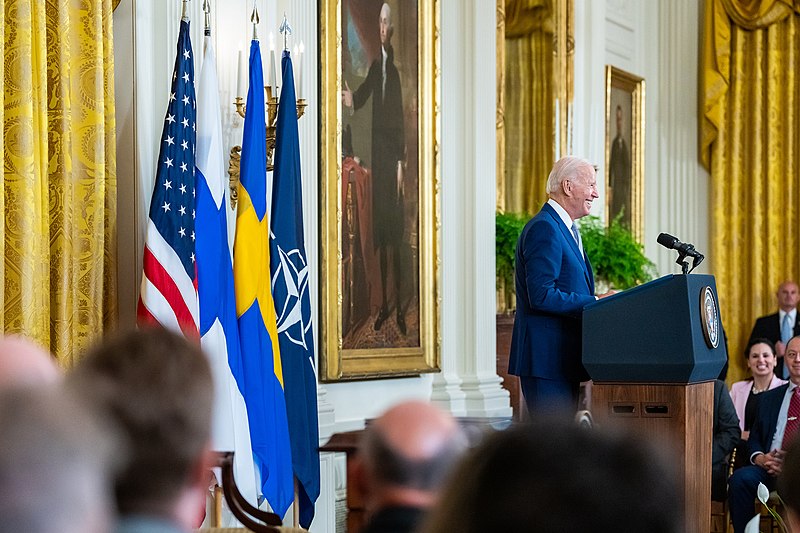US President Joe Biden announced this week that he ordered the release of 15 million barrels of oil from the country’s strategic reserves. The announcement follows the decision by the Saudi Arabia-led group of oil-producing countries to cut oil production.
Biden said Wednesday that the releasing of 15 million barrels of oil would complete the 180 million barrels his administration approved back in March in the midst of global energy concerns following the war in Ukraine. The White House said the 15 million barrels would be delivered in December.
“With my announcement today, we’re going to continue to stabilize markets and decrease the prices at a time when the actions of other countries have caused such volatility,” Biden told reporters during a news conference.
As of Wednesday, around 400 million barrels of oil remain in the US strategic reserve. The White House said the government would restock the reserve when prices of oil are at or lower than $67 to $72 a barrel and raised the possibility of additional releases during the coming winter months in order to keep prices down.
The US leader reiterated his criticism of oil companies for profiting from the worldwide energy crisis.
“My message to the American energy companies is this: You should not be using your profits to buy back stock or for dividends. Not now, not while a war is raging. You should be using these record-breaking profits to increase production and refining,” said Biden.
Biden and the Democratic Party are looking to quell the issue of high gas prices ahead of the upcoming midterm elections in November. Another such issue is reproductive rights, following the public outrage that resulted from the Supreme Court’s overturning of the landmark Roe v. Wade ruling that legalized abortion all over the country.
The Pentagon announced Thursday that it would provide assistance for service members who are seeking abortions, including covering their travel expenses for those who live in states where the procedure is banned or heavily restricted.
The order also included privacy protections that would shield service members from repercussions of abortion-related decisions and set guidelines so that local commanders are not allowed to influence whether service members get to receive access to care.
Defense secretary Lloyd Austin said the order would be completed before the end of the year.



 Japan’s Prime Minister Sanae Takaichi Secures Historic Election Win, Shaking Markets and Regional Politics
Japan’s Prime Minister Sanae Takaichi Secures Historic Election Win, Shaking Markets and Regional Politics  Antonio José Seguro Poised for Landslide Win in Portugal Presidential Runoff
Antonio José Seguro Poised for Landslide Win in Portugal Presidential Runoff  Israel Approves West Bank Measures Expanding Settler Land Access
Israel Approves West Bank Measures Expanding Settler Land Access  Trump Signs Executive Order Threatening 25% Tariffs on Countries Trading With Iran
Trump Signs Executive Order Threatening 25% Tariffs on Countries Trading With Iran  Bosnian Serb Presidential Rerun Confirms Victory for Dodik Ally Amid Allegations of Irregularities
Bosnian Serb Presidential Rerun Confirms Victory for Dodik Ally Amid Allegations of Irregularities  Trump’s Inflation Claims Clash With Voters’ Cost-of-Living Reality
Trump’s Inflation Claims Clash With Voters’ Cost-of-Living Reality  Trump Allows Commercial Fishing in Protected New England Waters
Trump Allows Commercial Fishing in Protected New England Waters  Bangladesh Election 2026: A Turning Point After Years of Political Suppression
Bangladesh Election 2026: A Turning Point After Years of Political Suppression  Trump Lifts 25% Tariff on Indian Goods in Strategic U.S.–India Trade and Energy Deal
Trump Lifts 25% Tariff on Indian Goods in Strategic U.S.–India Trade and Energy Deal  Japan Election 2026: Sanae Takaichi Poised for Landslide Win Despite Record Snowfall
Japan Election 2026: Sanae Takaichi Poised for Landslide Win Despite Record Snowfall  China Warns US Arms Sales to Taiwan Could Disrupt Trump’s Planned Visit
China Warns US Arms Sales to Taiwan Could Disrupt Trump’s Planned Visit  Ghislaine Maxwell to Invoke Fifth Amendment at House Oversight Committee Deposition
Ghislaine Maxwell to Invoke Fifth Amendment at House Oversight Committee Deposition  Jack Lang Resigns as Head of Arab World Institute Amid Epstein Controversy
Jack Lang Resigns as Head of Arab World Institute Amid Epstein Controversy  India–U.S. Interim Trade Pact Cuts Auto Tariffs but Leaves Tesla Out
India–U.S. Interim Trade Pact Cuts Auto Tariffs but Leaves Tesla Out  U.S. Lawmakers to Review Unredacted Jeffrey Epstein DOJ Files Starting Monday
U.S. Lawmakers to Review Unredacted Jeffrey Epstein DOJ Files Starting Monday  Federal Judge Restores Funding for Gateway Rail Tunnel Project
Federal Judge Restores Funding for Gateway Rail Tunnel Project  Anutin’s Bhumjaithai Party Wins Thai Election, Signals Shift Toward Political Stability
Anutin’s Bhumjaithai Party Wins Thai Election, Signals Shift Toward Political Stability 































